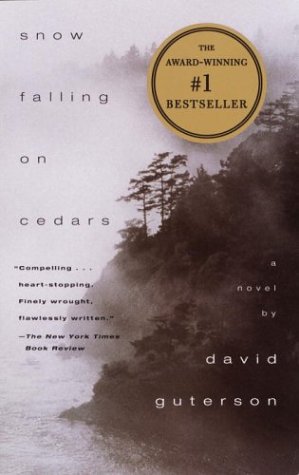 I wasn’t sure what to expect from this book. I knew they’d made a movie about it with Ethan Hawke, and I knew the movie had something to do with Japanese-Americans during WWII, but that was about it.
I wasn’t sure what to expect from this book. I knew they’d made a movie about it with Ethan Hawke, and I knew the movie had something to do with Japanese-Americans during WWII, but that was about it.
The book jumps around in time (which seems to be a common theme of the books I’ve been reading lately. I just finished Atonement and started on The Time Traveler’s Wife. Reviews of both forthcoming) and centers around a specific place rather than any particular characters. There are families that are central to the story, but you really get the sense that the small island off Puget Sound is a character itself and definitely informs the personality of the human characters.
I feel like a lot happened in the book, and that a long time period was covered, but the plot remained elegantly simple. The present time is focused on a murder trial. A Japanese-American, Kabuo, is accused of murdering a local fisherman, Carl Heine. A lot of the focus is on race—particularly the community’s prejudice towards the Japanese-Americans on the island. Early in the story, you learn that the wife of the accused—Hatsue, and another of the main characters, Ishmael, were high school sweethearts. Although race doesn’t initially influence their relationship, Hatsue and her family are shipped off to an internment camp, Ishmael serves in the war, and they both come back dramatically changed. Hatsue ends the relationship before she leaves, and Ishmael spends a large part of his life waiting for her to change her mind.
It was really interesting to read about Ishmael’s complex and conflicting emotions about Hatsue. He is obviously infatuated with her and truly loved her when they were together. He can’t move on with his life with a broken heart, though, and after fighting in the war and witnessing scores of atrocities, his perception of Japanese-Americans and the importance of race is altered for the worse.
There is a scene towards the end when Ishmael discovers strong evidence that would exonerate Kabuo. Even though the author never directly says as much, you know exactly the dilemma Ishmael is forced with. He has loved the defendant’s wife for so long and, the way the case is going, Kabuo could very well be imprisoned for the rest of his life. Does he come forward with the evidence and reunite the woman he loves with her husband or stay quiet and remove Kabuo from the picture? The morality is pretty clear but the book does an amazing job of revealing the true nature of human character. You could easily see Ishmael sitting on the evidence forever and letting Kabuo get locked up for a crime he didn’t commit. Considering this course of action, I felt such pity and disappointment towards Ishmael, but he still remains a sympathetic character and you can’t help but love him despite the bad choices he contemplates.
My heart was actually pounding in my chest during the last two chapters when he finally decides to share the evidence with the judge. There is a serious snow storm that falls on the island as the trial is ending, and it creates incredible tension as Ishmael moves slowly through the town with the delicate evidence in his coat pocket. You know just how easy it would be for something to go wrong, for it to be too late, and for Kabuo to end up in prison simply because the jury is prejudiced against him.
All in all, an awesome book. The pace was perfect and the characters were complex and fascinating. I highly recommend it.